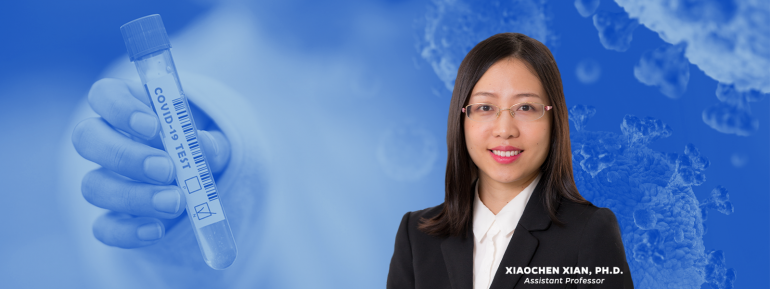Xiaochen Xian, Ph.D., an assistant professor for the Department of Industrial & Systems Engineering (ISE) at the University of Florida, recently received funding from the National Science Foundation in support of her research to develop adaptive sampling strategies for administering mass testing for COVID-19.
The purpose of the research is to establish a reliable framework that can identify patterns of virus transmission in vulnerable communities while minimizing the consumption of testing resources, such as the tests themselves, materials that make the tests, testing toolkits, testing personnel time and effort.
Dr. Xian and her team, which includes Alexander Semenov, Ph.D., UF ISE assistant research professor, Jaclyn Hall, Ph.D., from UF Health Outcomes & Biomedical Informatics and Thomas Hladish, Ph.D., from UF’s Department of Biology are working together to develop a data-driven, strategic sampling method for COVID-19 community testing.
In collaboration with LifeSouth Blood Bank and the Florida Department of Health, the team will collect geographic, demographic and socioeconomic data and combine this data with COVID-19 testing results to evaluate the contagion risk in certain communities. Based on the risk outcomes, the team will then design a sampling method that will determine how to select a small number of a large groups to receive the tests. This method will provide a basis for healthcare professional to decide each day as to whether mass testing should be conducted in specific communities.
“This model will greatly improve the testing efficiency and provide real-time decision making needed to address the pandemic in diverse and at-risk communities,” said Dr. Xian. By combining recent test outcomes and data indicators, the proposed framework will also enable objective testing resource allocation.
The research being done by Dr. Xian and her team will also enable future research on current unanswered questions regarding the transmission patterns of the virus, determining risk factors that influence when it is safe for groups to return to work as well as how to use mass testing to detect and stop community transmission, as economic activities open and increase. This data will also shed light on adaptive testing and resource allocation for other diseases.
“This is an exciting opportunity with many new possibilities for both methodological research and healthcare applications,” said Dr. Xian. The initial framework developed by the team will be implemented in North Central Florida and will eventually be scalable to other regions in the state.
This story was originally posted on UF Industrial Systems and Engineering.
Check out more stories about UF research on COVID-19.

